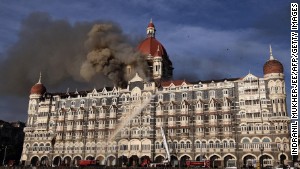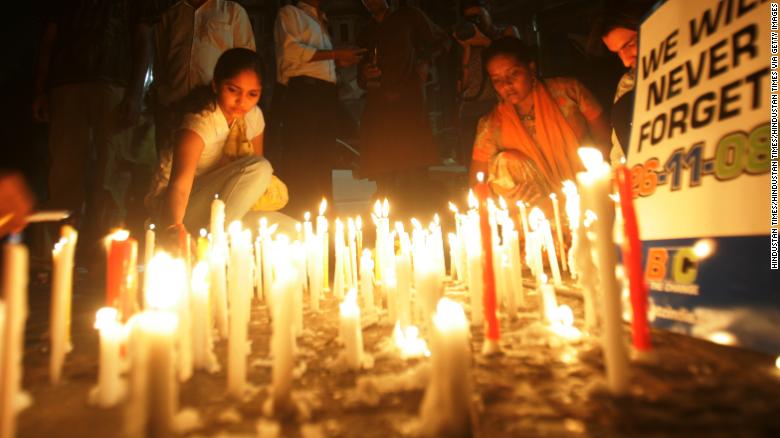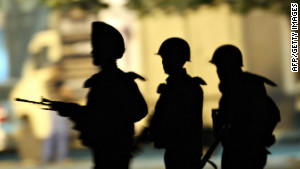By Michael Kugelman November 26, 2019

Editor’s Note: (Michael Kugelman is deputy director and senior associate for South Asia with the Woodrow Wilson International Center for Scholars in Washington, DC. You can follow him on Twitter @michaelkugelman. The views expressed are his own.)
(CNN)November 26 marks the 10-year anniversary of the Mumbai terror attacks. Over four terrifying days, 10 gunmen besieged India’s financial capital. They assaulted two hotels, a restaurant, a hospital, a railway station, and a Jewish community center. The massacre killed 164 people.
So much about the Mumbai tragedy was traumatic — from its excruciatingly long duration and cruel fixation on soft targets, to its ruthless efficiency and chillingly novel approach. Some Indians describe it as their 9/11.
One decade later, the Mumbai attacks continue to cast a long shadow over India — and the world.
For India, the attacks shattered the last great opportunity to pursue peace with arch-rival Pakistan. In 2007, promising back-channel negotiations — launched several years earlier and encouraged by Pakistani President Pervez Musharraf and Indian Prime Minister Manmohan Singh — had gained steam.
The negotiations focused on Kashmir — the territorial dispute at the heart of India-Pakistan tensions.
However, late in 2007 and then in early 2008, domestic politics in both countries got in the way, and the talks floundered. The mayhem in Mumbai — orchestrated by attackers associated with Lashkar-e-Tayyiba (LeT), a Pakistani terror group with ties to Pakistani intelligence — exploded any hopes of regaining momentum to resume the negotiations.
Though the two sides have made modest progress on trade and other low-hanging fruit over the last decade, bilateral ties have improved little. Pakistan’s lack of robust legal action against the Mumbai attack organizers constitutes one of the biggest obstacles to regaining more bilateral trust and sustaining dialogue.

26/11 Mumbai attacks: 10 years on survivors share their stories
Additionally, the Mumbai attacks intensified the anti-Muslim and anti-Pakistan rhetoric often heard in India during electoral campaigns — and which the current ruling party, the Hindu nationalist BJP, may use to rally its base in advance of elections next year.
Mumbai also exposed India’s sea-based security vulnerabilities, prompting New Delhi to step up maritime security enhancements that now constitute a major component of its overall military modernization effort.
The Mumbai attackers hijacked a fishing boat, killed four crew members, and sailed in to the city. This came 15 years after explosives arrived in the port city by ship and were used to build bombs that killed 257 people on March 12, 1993.
After the 2008 attack, Indian policymakers moved quickly. In 2009, they announced plans to build 100 warships over the next decade. They eventually developed a new three-tiered maritime security system involving maritime police, the coast guard, and the navy. They introduced major technology upgrades, including coastal surveillance radars and undersea sensors. And the coast guard increased its fleet from 74 to 134 vessels.

These maritime modernization efforts don’t only address sea-based security vulnerabilities. They also help further two key Indian strategic objectives: Keeping pace with rival China’s growing maritime power, and pursuing and protecting sea-based energy assets.
From a global perspective, the Mumbai attacks established a terrifying new template for terror — one that al-Qaeda and ISIS would often replicate in subsequent years. The blueprint is simple: Small bands of heavily armed assassins staging coordinated attacks on soft targets in urban spaces. The examples proliferate.
In 2013, militants stormed a shopping mall in Nairobi and bombers targeted the Boston Marathon. In 2015, gunmen besieged a concert hall, a sports stadium, and restaurants in Paris. And in 2016, assailants attacked the airport and a metro station in Brussels, and jihadists attacked a cafe in Dhaka. Additionally, potential Mumbai-style attacks in Copenhagen and Madrid were foiled in 2009 and 2015, respectively.
Counterterrorism officials immediately recognized Mumbai’s significance and how easy it would be to pull off elsewhere. It was, in the words of a former counterintelligence official for the New York City Police Department, “a watershed moment for counterterrorism.”
The article appeared in the cnn.com om 26 November 2018
